
Eliud Kipchoge: attempting a sub two-hour marathon
Two hours is a magic mark for marathon runners all around the world. Eliud Kipchoge, 2016 Olympic marathon gold medallist, missed this mark by only 25 seconds in May 2017. Why it’s only a question of time until the sub two-hour marathon becomes reality and why Eliud Kipchoge is the one to watch – a portrait of an exceptional runner.
No athlete has ever run 42,195 metres in under 120 minutes. Countless professional runners have attempted to, but all have failed. Some by minutes, others only by seconds. What’s certain is that the world’s best male runners are getting closer to the magic mark every year and won’t give up before the sub two-hour marathon has become reality. Especially one man: Eliud Kipchoge, 2016 Olympic marathon gold medallist and best long-distance runner of 2017, is the one to watch. Claiming that «if you don’t rule your mind, it can rule you», he’s convinced that finishing a marathon in under two hours isn’t about the legs, but about the heart and mind.
Every beginning is hard. Really?
When Kipchoge decided to focus on road running in 2013, track running lost a man of ambition, discipline and kindheartedness. The young Kenyan, then a successful runner of distances between 1,000 and 10,000 metres, had set countless records, but was never completely satisfied. He was looking for more; and decided to give up track running for long-distance running. «Once a marathon runner, always a marathon runner» – a sentence that’s omni-present when you’re around runners, often claiming that a marathon is «like a curse, it never lets go of you». That might be exactly what Kipchoge experienced when he won his marathon debut in Hamburg in 2:05:30 hours. With his very first marathon, the Kenyan catapulted himself into the world’s marathon elite and attracted world-wide attention from international press. A comeback without previous retirement, kind of.
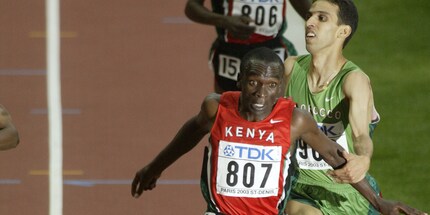
Kipchoge at age 18, winning the 5,000 metre race at the 2003 World Championships in Paris. This was before he became a long-distance runner.
Again and again
Four months after his marathon debut, Kipchoge came second at the Belin marathon with a finishing time that was 1 minute and 25 seconds faster than in Hamburg. Within the next year, he also came first in the Rottderdam and the Chicago marathon. A remarkable career – although nothing he didn’t know from his track running career. Having reached one summit, Kipchoge was already on the lookout for a new challenge.
No human is limited.
This man knows no limits. Therefore, it’s not surprising that he went on to win the London and Berlin marathon in 2015 and the Olympic marathon gold medal in 2016. Despite his quick rise to success, the Kenyan has always remained humble and eager to mention at interviews how important the heart and the mind are. He’s convinced that the legs are important, but psychological aspects are often underestimated.
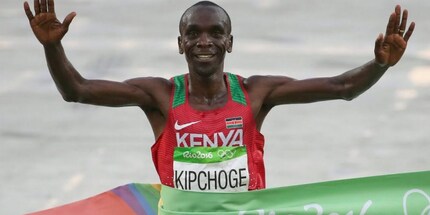
The (current) highlight of an extraordinary career: Olympic gold medallist Eliud Kipchoge 2016 in Rio de Janeiro.
The 2-hour barrier
All this success didn’t stop Kipchoge from attempting a world record on the Formula 1 race track in Monza. It only made him try even harder.
In 2016, Nike announced the project «Breaking2» and invited elite runners Lelisa Desisa, Zersenay Tadese and Eliud Kipchoge to break the two-hour barrier for the marathon. The Kenyan accepted the challenge and finished in 2:00:25. A world record – but not an official one, as the Nike event wasn’t accepted as an official race by the International Association of Athletics Federations (IAAF).
It's not about the legs, it's about the heart and mind.
This didn’t bother Kipchoge too much. He was happy his performance proved that the sub two-hour marathon can be done and that he only fell 25 seconds short. He’s on the right path, his legs can do it and his mind is ready. The real question isn’t whether Kipchoge will break the world record, but when this will happen.
Training, training and more training
In Monza, Kipchoge fell 25 seconds short of the 2-hour mark. 25 seconds might seem like no time at all; had he run only one second faster per kilometre, he would have set a new world record. However, as every long-distance runner would confirm, this only sounds easy in theory. It might be possible on the first few kilometres, but as you get more tired in the course of a race, it gets harder and harder to keep your pace. On kilometres 30, 35 or 40, it’s extremely difficult not to slow down.
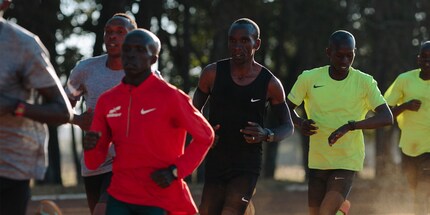
Daily training is essential – even for a professional runner who are in excellent mental condition.
Even though mind power plays a crucial role in running a marathon; your legs do a lot of the work. To make sure they keep up, it’s essential to train regularly and plan meticulously. Like in Formula 1, the best driver can only win if his car has a good motor.
Everything is possible
The Breaking2 project and Kipchoge’s time can’t be compared to a regular marathon. A marathon isn’t only about finishing as fast as possible, but also about tactics and controlling opponents. In Monza, the only thing Kipchoge had to care about was his finishing time; all other runners – except for Desisa and Tadese – were pace makers. They acted as friends, assistants and companions, but not as competitors.
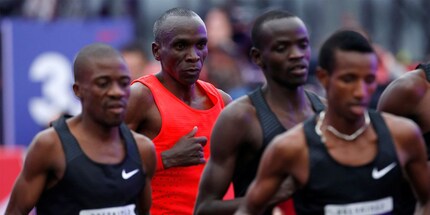
Surrounded by pacemakers and 120% focussed: Kipchoge at the Breaking2 race.
With this in mind, the 2-hour mark that seemed so close might be further away than assumed. However, this doesn’t put Kipchoge off; he still has his mind set firmly on this goal. What’s most impressive is that he works so hard, but makes it look like a walk in the park. A man from a simple background, Kipchoge is open-hearted and has learned to enjoy every moment and live life to the fullest. «Marathon is life», he says is the video above. For him, running is living. «You never know what’s going to happen. Planning a marathon is like planning life. It’s impossible to anticipate every detail, but I try to be prepared for all eventualities.»
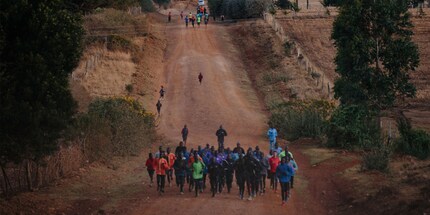
Kipchoge and co. training in Kenya.
It’s this attitude that makes Eliud Kipchoge exceptional and guarantees that we’ll read more about him in the future. Here’s a headline I’m expecting to read one day: «He did it – Eliud Kipchoge breaks the sonic barrier of marathon».
When I'm not stuffing my face with sweets, you'll catch me running around in the gym hall. I’m a passionate floorball player and coach. On rainy days, I tinker with my homebuilt PCs, robots or other gadgets. Music is always my trusted companion. I also enjoy tackling hilly terrain on my road bike and criss-crossing the country on my cross-country skis.
From the latest iPhone to the return of 80s fashion. The editorial team will help you make sense of it all.
Show all